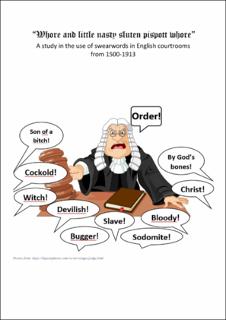“whore and little nasty sluten pispott whore”. A study in the use of swearwords in English courtrooms from 1500-1913
Master thesis
Permanent lenke
https://hdl.handle.net/11250/2670766Utgivelsesdato
2020-05Metadata
Vis full innførselSamlinger
- Student papers (HF-IKS) [905]
Sammendrag
Swearwords are words in all its respective meaning; they convey meaning and are made of sounds found in the English language. However, more than any other group of words they have the power to hurt, offend, and are by some even feared to change reality itself. Furthermore, swearwords can be used to signify anger, joy, surprise, and pain more readily than other words. They can be related sex (e.g. fuck, cunt, bugger), defecation (e.g. shit, piss), religion (e.g. hell, God, damn), racism (e.g. nigger), animal names (e.g. bitch, pig), insults referring to psychological or physical deviations (e.g. retard, wimp) and other categories.
Also, what makes swearwords so efficient to convey meaning and/or express strong feelings is their nature to shed light on social taboos. However, the offensiveness of swearwords is not universal across time and space. The 1500s to 1900s was a time of much religious and cultural turmoil in England which also affected the use of swearwords. Although the connection between cultural and religious change and the use of foul and obscene language is something that has been theorized before, it has never been examined with the use of relative numbers connected to authentic speech.
The data for this study was collected through trial-records from four different corpora, arranged into nine time periods of 50 years each, covering the years from 1500 to 1913, where any changes in the use categories were investigated in terms of frequency across the different time periods, while also referring, where possible, any changes in frequency back to religious and cultural changes. This study concludes that there have been four religious and cultural changes affecting the use of swearwords. Firstly, the Reformation. Secondly, architectural innovations starting in the Renaissance in addition to the growth of capitalism resulting in some words related to the sexual, excremental and anatomical becoming a new form of obscenities. Thirdly, the trend of manner and well-behaved speech resulting in “The Age of Euphemism”. And lastly, the secularization process which had a connection with the development of Protestantism, in addition to the growth of capitalism.
Beskrivelse
Master's thesis in Literacy studies
